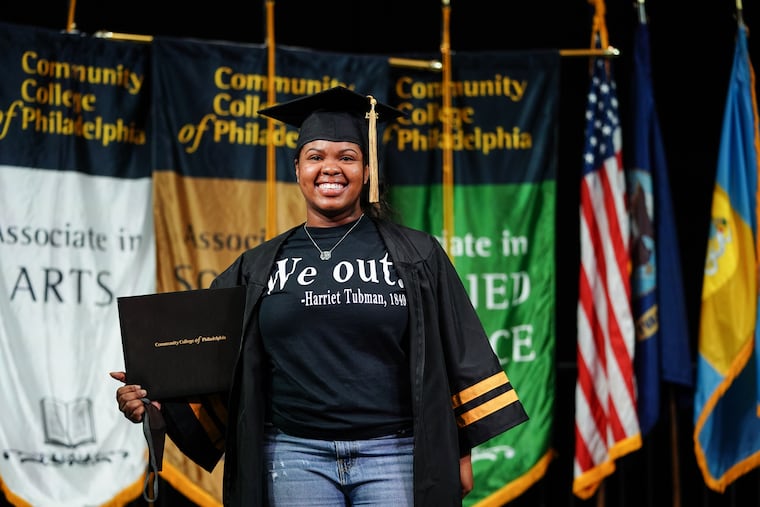For this Philly high school senior, graduating with two degrees will make all the difference
Laila Manigo kept repeating a mantra to herself: “This is going to be worth it, this is going to be worth it.”

At first, Parkway Center City Middle College was just a name on a form to Laila Manigo, a Philadelphia high school on a list of many. Her mother prompted her to apply to the program whose mission was new: to produce students who would graduate in four years with both a high school diploma and an associate’s degree.
“I didn’t know what an associate’s degree was,” Manigo said.
Her path from that moment to this one — Community College of Philadelphia degree in hand, poised to graduate from high school June 9 — was often rocky. Not every college course came easy, and she had to repeat some classes in summer school.
That’s what amazes Taara Green, Parkway Center City’s academic and internship support coordinator — basically the school’s sherpa to help students navigate their college journeys. While Manigo and her 90 classmates, Parkway Center City Middle College’s first graduating class, struggled at times, they stuck the landing.
“The bumps and turns — they’ve navigated everything with such grace,” Green said. “They would complain because that’s what teenagers do. But they showed out, as teenagers say. They never disappointed.”
Four years ago, Parkway Center City morphed from a traditional selective admissions school to a middle-college program, designed to improve college access, especially for students of color and young people who would be the first in their family to earn a university degree. The School District budgeted $1 million for the college studies.
It was a lofty goal. Of the original Parkway Center City cohort, 73%, or 90 of 121 students, are leaving with dual degrees. Four graduates earned at least 48 college credits; 27 students left the program.
There were days when Manigo thought she didn’t belong in college.
“I move not at a slower pace, but at my own pace,” said Manigo, 18, who lives in Kensington. “I’ve never been good at math, and that was hard. College expects things of you that high schools don’t. Specifically, for me, it was organization and trying to get everything together, but not stretch yourself out.”
But she kept repeating a mantra to herself: “This is going to be worth it, this is going to be worth it.”
The Parkway Center City students began their experiences slowly, with one college course the summer before their freshman year of high school, when they were 13 or 14. They took most classes at Parkway freshman and sophomore years but were handling full college course loads in their junior and senior years.
Academic support is baked into the program and was particularly key for Manigo, she said. She grew close to Green, who talked her through days when it felt as if college weren’t possible, listening to her cry and answering calls at odd hours.
“I would say, ‘I know you can do this,’” said Green, who grows teary when she talks about how far Manigo came. “She had her areas where she struggled, but because Laila has all of these other great skills, we would say, this is just minor. You can’t grow if everything is always easy for you.”
Aside from the academic rigors of college work, the pandemic also made Manigo’s path harder. She hasn’t set foot inside a classroom since March 2020 and losing the trappings of her senior year hurt. So did not getting into her first-choice college, Howard University.
But Manigo bounced back and will enter Temple University in the fall as a film major with 60 credits. This time, college doesn’t feel daunting at all. She knows what to expect.
And her family?
“My mom kind of brags about it all the time,” Manigo said.
The mom in question, Linette Rucker, is over the moon. That her high schooler already has a college degree in hand, an effective cut in college tuition costs going forward, and a jump on the rest of her life, is a dream, said Rucker, who works in a FedEx office. Manigo’s father is a truck driver; members of the family have started college, but few were able to finish.
“I just kept telling Laila, ‘You can do this.’ And now, look, she’s done it,” Rucker said.
“You get curveballs,” Manigo said. “It doesn’t really matter where you finish, but it’s how you finish.”